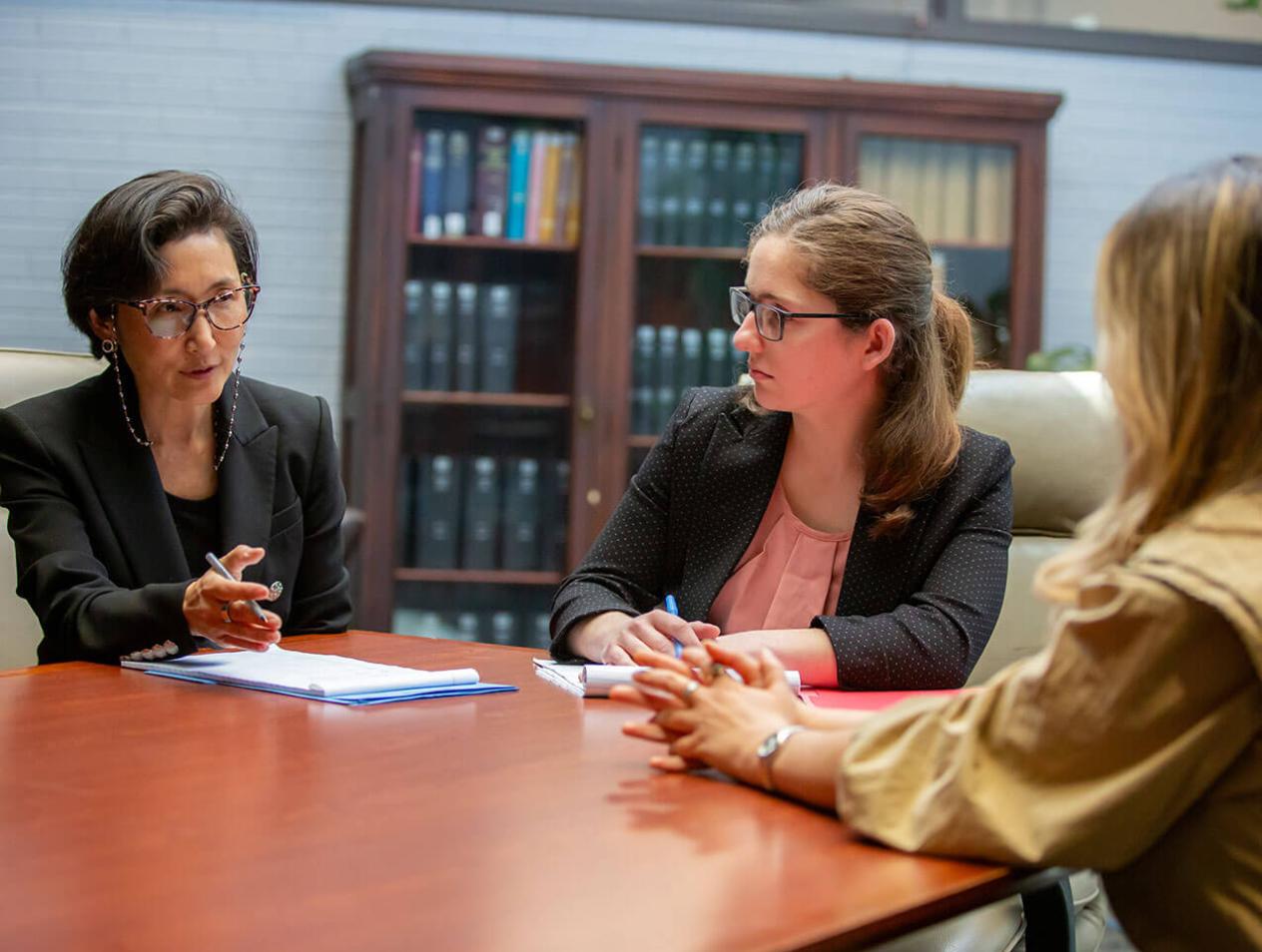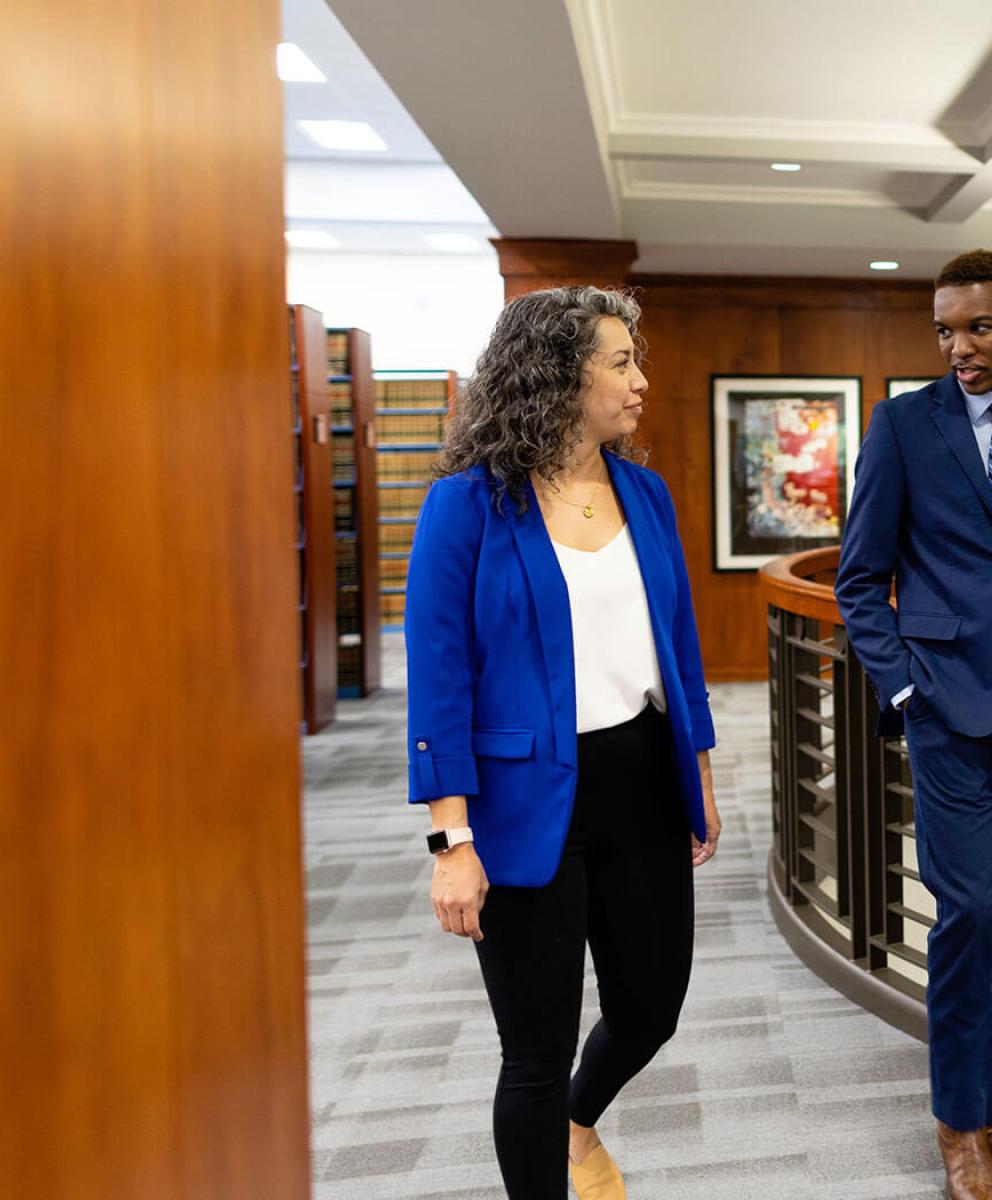
Milton R. Abrahams Legal Clinic
We're here to gain experience and be of service.
The Milton R. Abrahams Legal Clinic provides invaluable experience for Creighton University School of Law students—and free legal services related to civil matters for low-income residents of Douglas County, Nebraska. The clinic operates as a small law firm, which is staffed by Creighton School of Law students under the supervision of licensed attorneys.
Note that clinic attorneys do not respond to legal questions by email. If you want to request legal advice or assistance, please call us for an intake screening at 402.280.3068.
About our services and staff
Similar to a legal aid agency, the clinic provides free legal assistance to eligible clients. Specifically, we offer legal services to those in need within the greater Omaha community. These services include (but are not limited to) civil matters involving:
- Child support and custody
- Guardianship
- Divorce
- Wills, trust and probate
- Landlord/tenant issues
All clients agree to be represented by senior law students, who are certified to practice law in Nebraska under attorney supervision.
Students gain valuable, hands-on experience by being involved in all aspects of our clients’ cases. This includes initial client intake, identification of legal needs and preparation of legal documents. They will also represent clients in court. To ensure students gain exposure to the business aspects of legal practice, they will also maintain case files and be responsible for timekeeping.
Applying for Legal Services
If you’re a Douglas County resident who falls within the Federal Poverty Guidelines and are involved with a civil (i.e., non-criminal) matter, you are eligible for free legal services through the Abrahams Legal Clinic. Applications are taken over the phone. Please call 402.280.3068 between 8:30 a.m. and 4 p.m. Monday through Thursday.
You will receive a written notice of case acceptance or rejection within 7 to 10 days of your application. If you require a special accommodation to access our services, please call us or contact us via email.
What types of cases does the clinic accept?
The clinic accepts a wide variety of civil cases in Douglas County. These include cases related to family law, landlord-tenant disputes, issues with Department of Health and Human Services (DHHS) benefits, guardianships and conservatorships, simple probate matters, and contract disputes. The clinic also has special programs dedicated to clients who have experienced domestic violence and those attempting to obtain or maintain healthy, affordable housing. Note that the clinic does not practice in immigration or juvenile court. For cases involving juveniles, please contact our Juvenile Justice Legal Clinic.
Do I need to apply for services if I have only one question or want quick legal advice?
Yes. Clinic attorneys and law students will not respond to legal questions from non-clients over the phone or by email. All requests for legal advice or assistance should be directed to 402.280.3068 to complete an intake application.
Where is the clinic located?
The clinic is located on Creighton University’s campus at 2120 Cass Street. Our office is in the School of Law and has a private entrance off of Cass Street. Look for the blue Creighton Legal Clinic sign. The sign is alongside a pathway leading to an exterior staircase that will take you to the clinic in room 232 on the second floor. Free and metered parking is available along Cass Street, and free visitor parking is available on the northeast corner of 24th and Cass Streets.
How much will my case cost?
The clinic provides free legal services to its clients. While clients are still responsible for paying their own filing fees and other court costs and administrative expenses, the clinic’s staff regularly assists clients in completing “in forma pauperis” fee waiver applications to reduce or eliminate court costs and fees.
Real-World Experience
Recent graduate and Nebraska State Bar Association 2024 Rise Award winner Kathryn Matthews spent her third year of law school at Creighton Law’s Milton R. Abrahams Legal Clinic gaining exposure to several practice areas in civil law. The clinic’s real-life learning opportunities, faculty and student support and the self-teaching aspects of legal research helped Kathryn gain confidence to enter the workforce as a lawyer in the Army’s Judge Advocate General's (JAG) Corps.
About the Milton R. Abrahams Legal Clinic course (LAW 388)
The clinic serves as a four-credit course for Creighton School of Law students. During the course, students will learn about the range of legal issues that arise from inequalities within our society. The course also examines the experience of representing clients with serious educational, economic, intellectual, cultural and psychological disadvantages.
In addition to gaining hands-on experience, students may also have the opportunity to work with special projects such as the Domestic Violence Project and the Housing Law Project. Students in the clinic will learn to represent clients with professionalism and integrity while developing the following skills:
- Client interviewing and counseling
- Fact investigation
- Negotiation
- Recognizing and addressing ethical problems
- Drafting
- Law office organization and management
- Preparing for and conducting trials and administrative hearings
- Trial technique
How is the clinic different from my other law school courses?
The course aligns with a clinical legal education model that’s designed to complement the school’s doctrinal courses—providing students with the practical skills needed to be attorneys. Students learn how to:
- Communicate with clients
- Develop problem-solving skills
- Deal with difficult issues related to legal ethics
- Exercise professional conduct
- Gain an understanding of social inequities while providing free legal services
By giving students the opportunity to work with real clients in common situations, the clinic also helps students hone their instincts and protocols.
How is the clinic different from other legal internships or employment experiences?
The clinic operates much like a small law firm run by law students (under the supervision of licensed attorneys). Students do not merely assist in cases; they have their own caseloads and take primary responsibilities for all aspects of their cases. This includes client interaction, legal research, document drafting, court appearances and negotiations. Students must also perform tasks related to running a law office, such as keeping time records, maintaining client files, using case management software and a calendaring system, and providing appropriate accommodations to clients with disabilities or language barriers.
How many credits will I earn, and how am I graded?
Students who successfully complete clinic requirements will earn four credit hours, with the classroom component representing one credit hour. Work in the classroom is letter-graded, and casework is graded on a pass/fail basis.
How much time is spent on classroom learning versus casework?
During the first half of the semester, students attend the clinic classroom seminar for two hours per week. The seminar does not meet after the mid-semester break. The remaining credit hours are earned through clinic casework and client responsibilities, as well as meeting with supervising attorneys.
Do I need to take this clinic course to graduate?
Students who matriculated as of Summer 2016 must satisfactorily complete at least six credit hours of experiential learning. Enrollment in the Milton R. Abrahams Legal Clinic (LAW 388) will provide four credit hours toward this requirement.
What are the requirements for law students to represent clients?
Students must be senior certified to participate in trials and oral arguments; hold consultations with clients; advise clients on legal matters; and prepare pleadings, briefs, and other documents to be filed. This certification is provided by the School of Law’s dean to law students with “senior standing” who exhibit good character and competent legal ability. All LAW 388 students receive their senior certification at the start of the semester.
This certification process is done in alignment with the Nebraska Supreme Court’s Senior Law Student Practice Rules (Neb. Ct. R. §§ 3-701–3-706). These rules allow students to participate in legal activities under the general supervision of a Nebraska-licensed attorney.
Why should I take this clinic course if I do not plan to be a Legal Aid attorney?
The clinic aims to equip law students with practical abilities needed for their legal careers. Specifically, it emphasizes developing litigation skills—and confidence—that will help prepare them for a variety of legal careers, working with different types of clients. In fact, the clinic strives to identify and focus on the capabilities most desired by employers, so it can provide students with tasks and experiences that promote marketable skills.
What types of cases does the clinic accept?
Clinic students represent low-income Douglas County residents in a wide variety of civil cases, including family law, landlord-tenant disputes, guardianships and conservatorships, probate matters, and contract disputes. Cases are selected for their educational benefit to students and for potential litigation experience. Students will represent clients in Douglas County district and county courts. Occasionally, students have the opportunity to practice in the Nebraska Court of Appeals, the Nebraska Supreme Court and the U.S. District Court for the District of Nebraska.
How much time should I expect to spend in the clinic?
Students should treat the clinic like a part-time job. The workload is demanding but manageable, and many students have successfully balanced their casework with their third-year courses and other professional obligations. On average, students should expect to spend 10-12 hours each week on casework, which includes a supervision meeting to discuss cases. Some students prefer to work fewer hours each week and spread out their casework over the whole semester, including school breaks and final exams. Ultimately, casework cannot be scheduled with complete consistency because the timing of the work is driven by each case. Some weeks are more challenging than others because of court deadlines and client emergencies.
May I have outside employment while I am enrolled in the clinic?
Students cannot have outside legal employment—paid or unpaid—that may create a conflict of interest with the clinic. All outside legal employment must be reported to the clinic director at the start of the semester, so a conflict check can be performed. All students with outside employment are encouraged to speak with the clinic director before enrolling in the clinic to discuss whether they will have the necessary time and flexibility to devote to casework and client responsibilities.
Abrahams Legal Clinic Faculty & Staff

Mark Carraher, JD
- Staff Attorney, Abrahams Legal Clinic
- 402.280.3068
- View Profile

Christopher Mihalo, JD
- Staff Attorney, Abrahams Legal Clinic
- 402.280.3068
- View Profile

Michelle Parks
- Law Office Coordinator, Abrahams Legal Clinic
- 402.280.3068
- View Profile

Diane Uchimiya, JD, LLM
- Director, Abrahams Legal Clinic
- 402.280.3648
- View Profile





